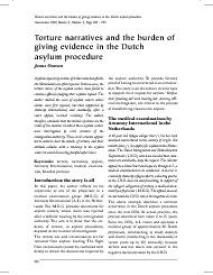Torture narratives and the burden of giving evidence in the Dutch asylum procedure
Asylum requests by victims of torture who have fled to the Netherlands are often rejected. In these cases, the torture stories of the asylum seekers have failed to convince officials judging their asylum request. The author studied the cases of asylum seekers whose claims were first rejected, but then supported by Amnesty International, and eventually, after a court appeal, received residency. The author, therefore, concludes that the initial rejections are the result of the manner in which these asylum seekers were interrogated by civil servants of the immigration authority. These civil servants appear not to want to hear the details of torture, and their attitude colludes with a tendency in the asylum seekers to avoid discussing painful experiences. Keywords: torture, narratives, asylum, Amnesty International, medical examination, Istanbul protocol
Geachte bezoeker,
De informatie die u nu opvraagt, kan door psychotraumanet niet aan u worden getoond. Dit kan verschillende redenen hebben,
waarvan (bescherming van het) auteursrecht de meeste voorkomende is. Wanneer het mogelijk is om u door te verwijzen naar de bron
van deze informatie, dan ziet u hier onder een link naar die plek.
Als er geen link staat, kunt u contact opnemen met de bibliotheek,
die u verder op weg kan helpen.
Met vriendelijke groet,
Het psychotraumanet-team.
Reference:
Janus Oomen | 2007
In: Intervention: the international journal of mental health, psychosocial work and counselling in areas of armed conflict, ISSN 1571-8883 | 5 | 3 | 250-255
http://www.interventionjournal.com/sites/default/files/oomen.pdf
In: Intervention: the international journal of mental health, psychosocial work and counselling in areas of armed conflict, ISSN 1571-8883 | 5 | 3 | 250-255
http://www.interventionjournal.com/sites/default/files/oomen.pdf


